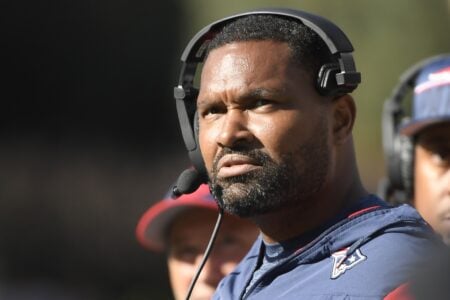- Joined
- Dec 22, 2005
- Messages
- 16,343
- Reaction score
- 7,623
People may value that one, but it doesn't mean people are right and that's the most valuable. That's actually my point.
Reason Brady's an amazing quarterback and has 3 rings has a lot more to do with that stat, his td-to-interception % than this one that people care about.
People are getting smarter though and hopefully 5 years from today we'll all be talking about what really matters. As it stands though the yards category and any stat that goes along with it, is the most meaningless one of them all.
Yards will get you on TV. Completion % will get you noticed. Points will get you credit. Interception % will get you to a Superbowl. And touchdown to interception % will win you a ring. Or even better TD to turnover %(fumbles are just as bad). TD to ints % will also get you a Dynasty
Tom Brady would probably still keep all his Starbucks records than trade them for all the other ones.
Gee, thanks for pointing out to me that Brady is an "amazing QB and has 3 rings." I guess I missed that.
Stats are what they are, but seldom as simple as they seem.
I've tracked them for a long time. I notice that you haven't been out here very much but I think people on this board will tell you that I keep my own databases of information on many key indicators. Turns out that one of them is the relationship between TD's and picks (which, by the rules of algebra, tracks the "td to interception %" on which you seem fixated).
The median TD/INT ratio for SB era QB's in the HOF is 1.29 (Average 1.32).
But, highly successful QB's are all over the place on this stat (as they are on most stats): Aikman, another "amazing" QB with "three rings," was only 1.17; Bradshaw, not a shabby QB with four rings, was only 1.01; Bart Starr, whom I personally consider the GOAT and who had five league championships to his name, was 1.10; Johnny U was 1.15. At the other end of the spectrum you have Steve Young at 2.17, Joe (Montana, not Namath who was actually 0.96) at 1.96 and Dan Marino at 1.67. The in-between crowd includes Roger at 1.40, Sonny Jurgensen and Jim Kelly at 1.35, Elway at 1.33 and Lenny Dawson at 1.31. I pick this mix because they cross several generations of NFL rules and CW as to how you win; and there are a lot of "rings" and a couple of "dynasties" at both ends of the spectrum.
So, Tommy at 2.61 as of this morning looks pretty good on that stat, as does Peyton at 2.02 and even Donovan McNabb, despite his problems in recent years, at 2.00. Donovan, of course, couldn't deliver a championship but by the measure you have highlighted, "smarter" people, in whose number you presumably did not count me, would put him at the top of the class, where he clearly does not belong. And, very relevant to this discussion, Drew Brees in his five years at NO is at 2.13 and Aaron Rodgers, as of this morning, is an other-worldly 3.47.
If we're looking for some measure that captures production and efficiency, Yards per Completion is as good as any. The average and median for SB era QB's in the HOF is 13.0. This number too is all over the place among the greats at this position: Joe Namath, of all people, is at the top of the class at 14.7, followed closely by Johnny U. at 14.2, with Terry Bradshaw at 13.8, Bart Starr at 13.7 and Staubach at 13.5. At the other end of this particular spectrum are Aikman at 11.4, Montana at 11.9, Steve Young at 12.4 and John Elway at 12.5. So, another stat with a bunch of rings and titles at each end of the continuum. Both Brady and Peyton are at 11.7 as of this morning.
My point is simple, taking any stat in isolation is kind of useless, thus the three bucks and a Latte analogy, with all respect to your pained analysis.
All I ever said about the regular season yards record is that it's kind of remarkable and something that people take notice of, but is not as important as winning the last game of the season; nothing more, nothing less. I really stand by that statement and nothing you've said changes my mind.
Last edited:


















